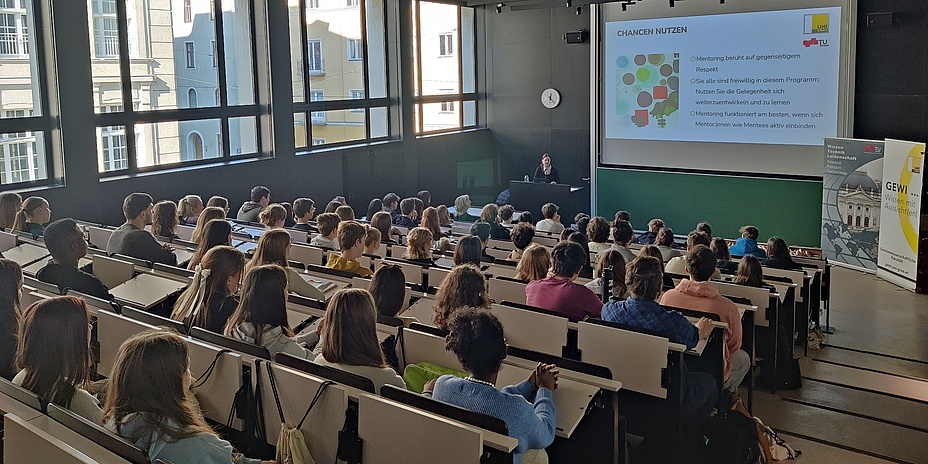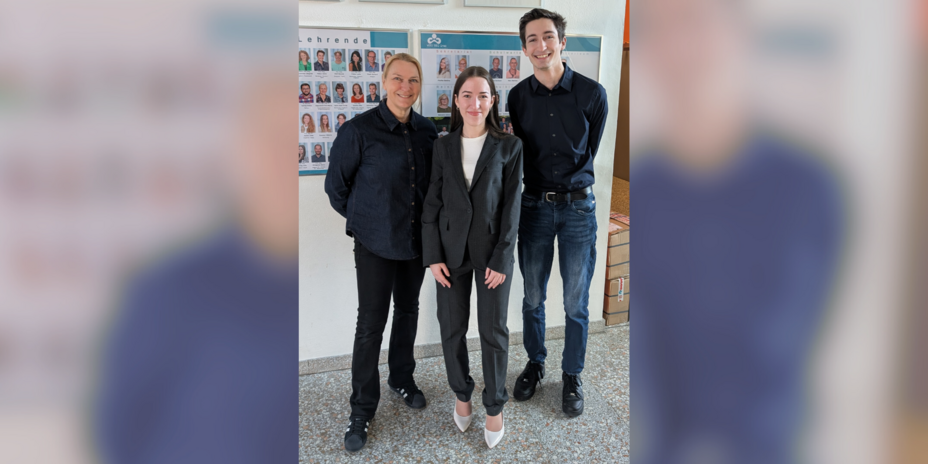The Matura (school leaving certificate in Austria) poses numerous challenges for Pupils at Austrian schools, including the final paper / thesis at grammar schools ("Abschließende Arbeit" or ABA) or the diploma thesis ("Diplomarbeit") at vocational secondary schools - a monograph designed to give students an introduction to academic writing. Many high school graduates are faced with the question: ‘How do I approach this?’ - and this is exactly where TU Graz and the University of Graz lend pupils a helping hand by having mentors - experienced students - show pupils how to do it as part of the mentoring programme for pupils! Below you can read how we were able to help one pupil in particular.
Imagine you are confined to a hospital bed due to an illness. You cannot move or communicate, but you can still perceive your surroundings. Is it possible to look into your brain so that relatives can see what you are feeling? This was the question that Anna Migl, a pupil at the Wirtschaftskundliches Bundesrealgymnasium Graz (WIKU), asked herself, which is why she chose ‘Brain Computer Interfaces’ as the topic for her thesis. She knew that she would have to delve deep into a complex subject, so the mentoring programme came at just the right time as the ideal support.
In the mentoring programme, students use their experience in academic writing to help prospective high school graduates with their theses and also provide insights into everyday student life.
All beginnings lie in the sources
Anna was assigned to me, Julian Rakuschek, a doctoral student at TU Graz, in the mentoring programme. Although I don't work in the biomedical field, I can still help out as a computer scientist. The foundations for her work were already laid at the first meeting, with writing playing just as important a role as a first insight into how science works and communicates - namely by means of scientific articles (papers), which proved to be the best sources for her work due to the strict peer review process. Mentors help in particular to overcome inhibitions about complex sources.
... especially in human sources
However, the inhibition is not only lowered in written sources, but also in human sources: Professors! As a mentor, I helped to arrange an interview with a leading expert in the field of brain-computer interfaces: Prof Dr Selina Wriessnegger, deputy head of the ‘Institute of Neural Engineering’ (TU Graz). The interview allowed Anna to explore fundamental questions and gain a direct insight into the current state of research and the Biomedical Engineering programme at TU Graz.
Assoc.Prof. Mag.rer.nat. Dr.phil. Selina Christin Wriessnegger is a professor at the Institute of Neural Engineering and conducts research in the field of cognitive neuroscience with a focus on brain-computer interfaces, motor imagery, virtual reality-based neurofeedback and neuroadaptive systems. We would like to thank Prof Wriessnegger for her commitment!
Write first, then present
Mentors play a particularly important role during the writing process, as they are always available for feedback. For example, Anna was introduced to the IEEE citation style widely used in the technical sciences, which is - by the way - an important element of scientific writing at TU Graz. All it took was a few iterations of feedback and Anna had a clean thesis in her hands. What was still missing: the final presentation!
Practice makes perfect
What is part of everyday life for doctoral students is often a challenge for pupils: presenting in front of colleagues. Mentors play an important role here, as they can ease this inhibition and provide valuable tips for a good presentation. Anna was also given the best opportunity to practise: a presentation in a seminar room with an audience of strangers, which helped her to optimally prepare for the final presentation, especially with subsequent questions. Anna was therefore able to successfully defend her thesis on 21 March 2025 - even with a surprise guest: Prof Dr Selina Wriessnegger!
We congratulate Anna on her successful thesis and are delighted that the mentoring programme was able to make a valuable contribution!
The mentoring programme is open to all Styrian grammar and vocational high school students. Interested pupils in the second-last school year and students can register for the programme each autumn. The pupils are then accompanied by their mentors for a year.
![[Translate to Englisch:] [Translate to Englisch:]](https://www.tugraz.at/fileadmin/_processed_/4/e/csm_Titelbild_Mentoring_Auftakt_kleiner_b3067c90ad.jpg)



![[Translate to Englisch:]](https://www.tugraz.at/fileadmin/_processed_/4/e/csm_Titelbild_Mentoring_Auftakt_kleiner_1acdd791f0.jpg)
![[Translate to Englisch:]](https://www.tugraz.at/fileadmin/_processed_/7/c/csm_Blogbeitrag_Literaturrecherche_mit_KI_44962cee9a.png)

